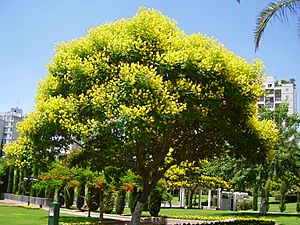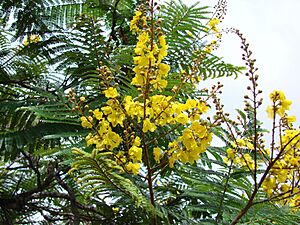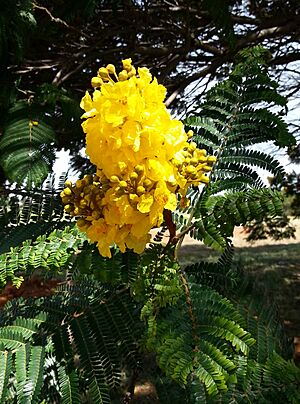Peltophorum dubium facts for kids
Quick facts for kids Peltophorum dubium |
|
|---|---|
 |
|
| Scientific classification |
|
| Kingdom: | Plantae |
| Clade: | Tracheophytes |
| Clade: | Angiosperms |
| Clade: | Eudicots |
| Clade: | Rosids |
| Order: | Fabales |
| Family: | Fabaceae |
| Genus: | Peltophorum |
| Species: |
P. dubium
|
| Binomial name | |
| Peltophorum dubium (Spreng.) Taub.
|
|
| Script error: The function "autoWithCaption" does not exist. | |
Script error: No such module "Check for conflicting parameters".
The Ibirá-pitá (scientific name: Peltophorum dubium) is a beautiful tree. It belongs to the pea family, known as Fabaceae. This tree has different names depending on where you are. In Argentina and Paraguay, it is called Ibirá-pitá. People in Uruguay call it árbol de Artigas, and in Brazil, it is known as Cambuí. It is a very tall tree, often growing between 20 and 25 meters (about 65 to 82 feet) high. It usually has a straight trunk.
Contents
What the Ibirá-pitá Tree Looks Like
The Ibirá-pitá tree has several interesting features.
Leaves and Foliage
Its leaves are a bright green color. They are deciduous, which means they fall off during certain seasons, usually in autumn or winter. The leaves are large and made up of many smaller leaflets. This special arrangement is called bipinnate.
Flowers
The flowers of the Ibirá-pitá tree are about 2 centimeters (less than an inch) wide. They grow in bunches that look like spikes. These flowers are very bright and noticeable. They usually bloom in the summer and at the beginning of autumn.
Fruits and Seeds
After the flowers, the tree produces its fruits. These fruits are flat, feel leathery, and are brown in color. They are a type of legume that does not open on its own to release the seeds. Inside these fruits, you will find hard, cylindrical seeds.
Where the Ibirá-pitá Tree Grows
The Ibirá-pitá tree naturally grows along riverbanks. You can find it in the southern parts of Brazil, the northeastern parts of Argentina, and in Paraguay. It also grows in the northern areas of Uruguay.
This tree is originally from tropical areas. However, it can also grow quite large in places with a milder, temperate climate. People have planted these trees in cities too. For example, you can see them lining the avenues in Buenos Aires, Argentina, and Montevideo, Uruguay.
See also
 In Spanish: Peltophorum dubium para niños
In Spanish: Peltophorum dubium para niños
 | James Van Der Zee |
 | Alma Thomas |
 | Ellis Wilson |
 | Margaret Taylor-Burroughs |



